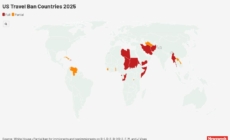-
Heat advisory is extended as SoCal is set for another scorcher - 4 mins ago
-
Newsweek’s AI Impact Awards 2025 - 35 mins ago
-
The Smartphones Haven’t Defeated Us. Yet. - 36 mins ago
-
Anne Burrell Update Given on Death as Tributes Pour In - about 1 hour ago
-
If Trump Wants War With Iran, Let’s Hear From Congress First - about 1 hour ago
-
Satellite Images Show US Navy Vessels Deploy as Possible Iran Attack Looms - 2 hours ago
-
Aiming at the Dollar, China Makes a Pitch for Its Currency - 2 hours ago
-
Map Shows U.S. Middle East Travel Warnings as Possible Iran War Looms - 2 hours ago
-
Trump’s Conflicting Messages on Workplace Raids Leave Businesses Reeling - 3 hours ago
-
China Reacts to Trump Khamenei Threat - 3 hours ago
The Strange Political Coalitions Forming Amid Iran-Israel War
What seemed impossible just weeks ago—Tucker Carlson agreeing with Bernie Sanders, Alexandria Ocasio-Cortez co-sponsoring a resolution with Thomas Massie—is now unfolding.
The recent escalation between Iran and Israel has upended traditional political alliances in Washington. Foreign policy hawks are teaming up with pro-Israel Democrats to support military action, while MAGA hardliners and progressive Democrats are unexpectedly aligned in opposing U.S. involvement in another Middle East conflict.
President Donald Trump, who coined the America First policy, now finds himself pulled in opposite directions—by Israeli allies urging stronger U.S. support and by populist conservatives warning against another entanglement in the Middle East.
His initial hesitation gave way to public praise for Israel’s strikes, but the shift has triggered backlash from some of his most loyal media allies and exposed cracks within his political base. Tucker Carlson, the former Fox News host, was among the first to point out the emerging cracks in the MAGA base.
TUCKER CARLSON: People who love and promote violence always face consequences in the end.
I’m not anti-Israel, far from it.
But if you think saying “let’s focus on our own country” is hate, you’ve lost perspective. pic.twitter.com/moTlfXdssQ
— STEVE BANNON 🇺🇸 (@Stevebannon_sk) June 16, 2025
The Anti-War Bloc: MAGA Meets Progressives
“I’m really afraid that my country is going to be further weakened by this,” Carlson said during a June 17 interview with former Trump chief strategist Steve Bannon. “We are going to see the end of the American empire.” Together, the two longtime allies of the president have become the loudest voices on the right pushing back against U.S. involvement in Israel’s war with Iran.

Getty Images
“They’re turning up the propaganda hose and trying to knock elderly Fox viewers off their feet,” Carlson said, blaming his former network’s hawkish stance on longtime personalities like Sean Hannity and Mark Levin. Bannon went further, accusing Rupert Murdoch’s media empire of pushing another unnecessary war and suggesting Fox had never fully backed Trump after 2020.
President Trump, speaking at the G7 summit in Canada on Monday before his abrupt departure, brushed it all aside. “I don’t know what Tucker Carlson is saying,” the president told reporters. “Let him go get a television network and say it so that people listen.” Later, he referred to Carlson online as “kooky.”
But Carlson and Bannon aren’t the only ones raising red flags. In the House, Representative Thomas Massie of Kentucky, a libertarian-leaning Republican, introduced a War Powers resolution aimed at blocking any U.S. military involvement in the conflict. His unlikely ally? New York Democrat Alexandria Ocasio-Cortez, who responded simply: “Signing on.”
Senator Rand Paul, another Republican of Kentucky, warned that “the same neoconservatives who sold us Iraq” were back at it. “The American people overwhelmingly oppose endless wars,” he said, urging Trump not to let outside pressure dictate U.S. foreign policy.
In Georgia, Republican Congresswoman Marjorie Taylor Greene struck a more spiritual tone, posting, “Pray that we aren’t attacked on our homeland after our border was open for 4 years and millions of people and millions of gotaways came in.” Greene, a steadfast Trump supporter, has nonetheless advised caution—urging the president not to rely too heavily on Israeli claims about Iran, citing past intelligence failures as a cautionary tale.
“War has bad consequences. We voted for America First,” she added.
Pray for our troops. 🙏
Pray for the innocent people in Israel and Iran. 🙏
Pray that we aren’t attacked on our homeland after our border was open for 4 years and millions of people and millions of gotaways came in. 🙏
War has bad consequences.
We voted for America First.
— Rep. Marjorie Taylor Greene🇺🇸 (@RepMTG) June 16, 2025
Even Matt Gaetz, the former congressman from Florida and longtime MAGA loyalist, joined the opposition. “This isn’t 2003,” he wrote on X. “We’re not going to be lied into another war. Not this time.”
Over on the left, Senator Bernie Sanders of Vermont called Israel’s offensive “reckless and illegal” and introduced legislation—the “No War Against Iran Act”—to block any unauthorized U.S. military funding. “We will not be dragged into Netanyahu’s war of choice,” Sanders said.
Massachusetts Senator Elizabeth Warren, often targeted by Trump in speeches and posts, stood beside Sanders. “The Constitution is clear—Congress decides when we go to war,” she said. Senator Chris Murphy of Connecticut called the Israeli strike “an effort to submarine the nuclear negotiations,” while Representative Ro Khanna of California described the situation as “a repeat of the same mistakes that brought us into Iraq.”
Though the two most powerful Democrats on the Hill, House Minority Leader Hakeem Jeffries and Senate Minority Leader Chuck Schumer, have been relatively silent. Schumer did not sign onto the Sanders’ resolution, even though he sponsored similar legislation as recently as 2020.
On the right, Charlie Kirk, a conservative activist influential in MAGA circles, captured the mood from the base. “There’s a major schism in the MAGA online community,” he said. “Our people do not want war. They want their president focused on fixing this country—not fighting someone else’s.”
The Pro-Strike Camp: Hawks and Loyalists
While ideological opposites on most domestic issues, foreign policy hawks in both parties are finding common ground over the Israel-Iran war. The new pro-intervention bloc stretches from Republican strongholds in the South to blue districts in New York and Pennsylvania—united by a belief that Iran’s nuclear ambitions can no longer be contained through diplomacy.

Getty Images
South Carolinas Senator Lindsey Graham and Pennsylvania Senator John Fetterman don’t typically end up on the same side of a foreign policy debate. But both are backing Israel’s military strikes and urging President Trump to follow through. “Our commitment to Israel must be absolute,” Fetterman said, while Graham insisted the U.S. must help “finish the job” if Iran refuses diplomacy.
Time’s up on Iran’s evil regime and its nuclear weapons program. 🇮🇱
— U.S. Senator John Fetterman (@SenFettermanPA) June 16, 2025
New York Democrat Ritchie Torres and Republican House Speaker Mike Johnson issued near-identical defenses of the offensive. “Israel IS right—and has a right—to defend itself!” Johnson said. Torres echoed, “Israel is not the aggressor. The true aggressor is the Islamic Republic and its empire of terror.”
Texas Senator Ted Cruz and Ohio Democrat Greg Landsman agreed that diplomacy had run its course. Cruz called Iran’s defiance “a direct insult to the Trump administration’s efforts,” while Landsman lamented, “Diplomacy has been given every opportunity… force is now necessary.”
Complicating matters, some ascendent voices from the MAGA movement, exemplified by far-right commentator Laura Loomer, have turned on fellow conservatives who oppose military involvement. Loomer, who is fiercely backing Trump’s authority to act, called on supporters to expose any right-wing critics of the president.
“Take screenshots of every single right winger who is s–t talking Trump right now,” she posted to her 1.7 million followers on X. Her targets included fellow MAGA figures like Tucker Carlson and Marjorie Taylor Greene, whose anti-war positions she blasted as betrayal.
President Trump, meanwhile, seemed to side with Loomer. He reposted replies supporting her call-out campaign and fired back at Carlson directly on Truth Social: “Somebody please explain to kooky Tucker Carlson that IRAN CAN NOT HAVE A NUCLEAR WEAPON!”
Even former National Security Adviser John Bolton—often at odds with Trump in the past—was aligned with this emergent war coalition. He called Netanyahu’s offensive “20 years overdue” and urged the U.S. to prepare for “phase two—potential regime change.”
Whether Trump leans toward escalation or restraint, the fracture lines cut through both parties—and through the MAGA movement itself.
Source link






















